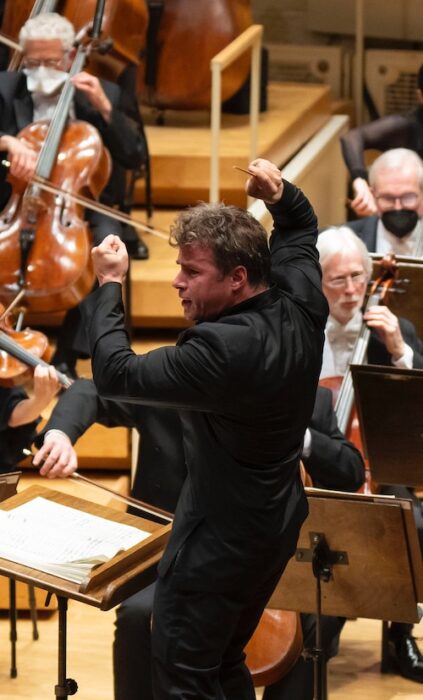Chicago Symphony musicians shine in a resplendent Mahler farewell with Hrůša

Gustav Mahler’s Symphony No. 9 was not his final creative statement. The unfinished Tenth—with a substantial Adagio fully orchestrated—stands as his true swan song.
But the epic Ninth Symphony (1909), Mahler’s last completed work, feels very much like a final musical will and testament. The composer had already been diagnosed with the heart disease that would end his life in three years at age 50, and the Ninth is imbued with an intense, elegiac quality. The two-note motif that dominates the opening movement virtually says “Leb wohl” and the symphony seems to bids adieu to earthly life in all its darkness and mendacity as much as its pleasures and beauty.
Mahler’s Ninth Symphony was the sole work on the Chicago Symphony Orchestra program Thursday night, conducted by Jakub Hrůša.
Although the Czech conductor has only led the CSO on two previous occasions (in 2017 and 2021), so successful were those concerts that Hrůša achieved quick popularity with local audiences and, it seems, many CSO musicians.
With the music director job wide open, Hrůša is a sure candidate on any short list of Riccardo Muti successors. An invitation by the orchestra to conduct a long and complex work like Mahler 9 inevitably made this week’s event feel like something of a first interview.
Hrůša, 42, has a dynamic style that makes for an exciting and charismatic podium presence. At tempo accelerations and building to climaxes, his physical windups and lunges were allied to a dizzying baton that rivals Georg Solti in his prime for land-speed velocity.
Outwardly, Mahler’s Ninth is cast in the traditional four movements but that’s where tradition ends. Two vast slow movements frame a sardonic ländler and haunted scherzo in a score that spans 85 minutes.
In the opening Andante comodo Thursday night, the first appearance of the sighing theme that dominates the movement had an uncommonly gentle expression. Hrůša directed the epic movement with an organic flowing quality, spacious yet always on the move. Nothing was overdone or overlooked; the eruptive climaxes went with force and brassy brilliance without blaring.
Hrůša waited patiently for a burbling musical cell phone to stop ringing before starting the second movement.
The inner movements were strongly characterized. In the quasi-ländler, Hrůša conveyed the initial charm of the dancey theme; as the music becomes increasingly agitated he underlined aggressive bite without going over the top or sacrificing an essential Viennese quality. The contrasting lyric sections registered without undue sentiment and the delicate coda went with just the right lilt and piquant charm.
The ensuing Rondo-Burleske crackled with unhinged energy and nerve-wracked desperation. The serene middle section provided balm albeit in a somewhat cool expression.
The vast concluding Adagio is one of Mahler’s finest achievements and the apex of this work. With rich and burnished playing by the strings, the valedictory essence of the main theme was firmly manifest yet unsentimental. Hrůša built the theme’s overlapping string waves to a resplendent climax.
Halfway through the long, hushed diminuendo a loud unmuffled cough by an audience member crashed into the reverie. It may be time to bring back the death penalty in Illinois.
Yet Hrůša and the CSO maintained concentration despite the jarring disruption. Mahler’s lingering farewell was handled with great sensitivity by all as the ebbing string phrases slowly faded to silence. The conductor held it for an extended minute before lowering his hands.
Interpretively, this was an estimable Mahler Ninth by any measure. Hrůša’s pacing was exemplary, tuttis imposing and balancing skillful with great clarity to textures. Crucial instrumental lines were always audible when they needed to be.
And yet one came away from Thursday’s performance more impressed with the playing than moved by the music. In this, one of Mahler’s most deeply felt scores, there was often a curious lack of expressive engagement. While skillfully directed by Hrůša, the deeper emotions were held at arm’s length, with many passages of existential bleakness left unexplored. Overall, this felt like a young conductor’s Ninth, more literal than lived-in. Hrůša’s Mahler will likely grow in depth and nuance with time and further performances.
Ultimately, it was the CSO’s night to shine in this intensely challenging score and all musicians were at their considerable finest—as an ensemble, by section and individually.
Primus inter pares was principal horn David Cooper, who delivered a virtual seminar in Mahler playing—finely polished, sensitive to dynamics and providing the most beautiful and expressive moments of the night. His section colleagues were on a comparable level.
Other standout solo work was delivered by guest principal violist Teng Li of the Los Angeles Philharmonic, principal bassoon Keith Buncke, principal trumpet Esteban Batallán, and concertmaster Robert Chen. The CSO strings en masse were extraordinary in the final pages, playing with acute concentration and rarefied sensitivity down to a barely audible triple pianissimo.
Mahler’s Symphony No. 9 will be repeated 8 p.m. Friday and Saturday. cso.org

Posted Jun 11, 2023 at 2:49 pm by Claude M. Weil
I have been attending CSO concerts since the days 0f Desire Defauw and it hardly needs to be said that any any performance of Mahler’s 9th would be on my agenda. It never fails to evoke ones deepest feelings, particularly the final movement. For the average listener, such quibbles as many critics focus on, don’t matter. It is the totality of the work which matters. It is always a privilege to be in the audience when this work is performed.
Claude M. Weil